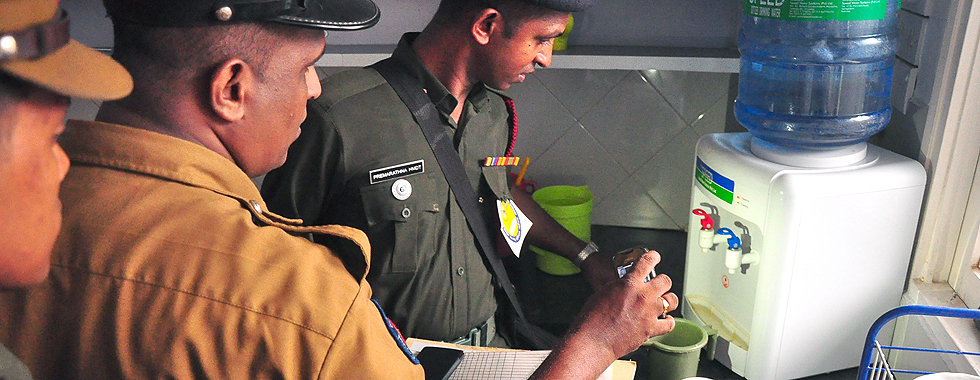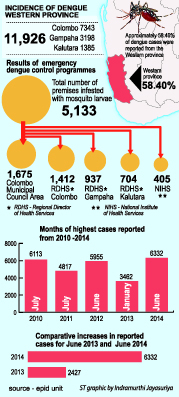News
Battle of the sting goes to Colombo 7
The campaign to eradicate dengue continued in the Western Province, with health officials backed by security personnel moving into Colombo 7 this week to check on mosquito breeding grounds.

Officials checking a kitchen. Pic by Mangala Weerasekera
We accompanied one of the teams involved in the campaign and we observed that the officials were quick to identify possible breeding grounds.
Pointing at a pond where a lone catfish lay, Dimutha Thushara a Warrant Officer of the Sri Lankan Army accompanying said, “This won’t do. There is a chance of dengue mosquitoes breeding here, however if you could fill this up with guppies the threat could be eliminated.”
The team next moved into the kitchen of the particular household. Reaching under the sink they found a bowl filled with water collected from a leaking pipe. It  contained hundreds of tiny mosquito eggs. The domestic was found to be at fault. “It is not we who suffer when these mosquitoes grow into adults and bite a member of the household. Dengue can be fatal therefore we must ensure its prevention,” the team advised the household members.
contained hundreds of tiny mosquito eggs. The domestic was found to be at fault. “It is not we who suffer when these mosquitoes grow into adults and bite a member of the household. Dengue can be fatal therefore we must ensure its prevention,” the team advised the household members.
The team visited 13 houses that day. Most residents give us permission to enter, some however refuse us at the door with the words “Nona Gedara Ne” (Madam is not at home). A yellow leaflet was issued to these households.
The kitchens, bathrooms and the gardens of these houses were checked, and the occupants advised in the process.
Earlier in the day (Wednesday, July 9), over 1900 people including members of the tri forces, the STF and health officials gathered at Campbell Park in Borella, to begin phase 2A of the Emergency Dengue Control Programme.
Around 306,305 premises were visited by these teams under an emergency dengue programme that was started on June 20 and ended July 10. According to reports of the Health Ministry’s Epidemiology Unit around 5133 premises were found to contain mosquito larvae. The larvae were destroyed immediately during the inspections tours.
Colombo Municipal Council (CMC) Chief Medical Officer Dr. Ruwan Wijayamuni, told the Sunday Times that in the first two weeks of June there was a 60 percent increase in the number of dengue cases compared to June last year. “With this campaign we were able to bring this figure down to 40 percent, and in the first week of July it was brought down to five percent,” he said.
When asked why health officials do not look into cleaning canals and other water ways, that possibly pose a bigger threat than a common household, Dr. Wijayamuni said, “When a canal is free of garbage, usually the water contains fish like NalaHandaya or Thithaya. These are larvivorous fish, that eat the mosquito larvae. The problem however lies with polluted water bodies with solid waste like yoghurt cups, water bottles etc, as these objects float on the water and no fish can access these contents and as a result mosquitoes breed on these surfaces. We are aiming at these places too.”
Chief Epidemiologist, Director, Central Epidemiological Unit, Ministry of Health, Sri Lanka, Dr. Paba Palihawadana said, “the dengue situation in Sri Lanka is similar to those of other countries as well, it is a cyclical process and it comes every two or three years. Sustainability of these programmes has to be there. It is a complex disease and a lot of external factors play a key role in it.”
“The Ministry of Health doesn’t have the capacity to visit all homes and destroy dengue breeding places, therefore the president has asked the Defence Ministry to help. The tri forces are mobilising their troops, this however cannot be done continuously,” she said.
Dengue Control Unit- Spokesperson Dr. Nayana de Alwis said, “This problem cannot be tackled by the health authorities alone, people have to also cooperate. At a meeting of the presidential task force recently the Navy Commander said that we should tackle this as a war like situation and not just on an ad hoc basis.”
“The only way to control a viral disease is either to have a vaccine or get rid of the cause. With dengue there are four types of viruses and there needs to be a vaccine for each virus. There are genetical changes in all these four types,” Deputy Municipal Commissioner (Health Services) Dr. Pradeep Kariyawasam said.
“A lot of Government agents have large areas of land and housing schemes and various settlements such as the Summit Pura, settlement in Mattakkuliya and most of these lands are not maintained. All government institutions are responsible. There are several private construction sites too that are not maintained,” he said.
“Uilising soldiers in campaigns is not a sustainable solution, instead we should train 100-200 people, possibly A/L educated youth who could go and regularly inspect these premises. Schoolchildren could also be asked to check their surrounding premises.”
Director of the Police Environmental Health Unit SSP Quintus Raymond told the Sunday Times, “We have 432 stations islandwide and each of these stations has an Environmental Unit , that could play a supporting role with Health Ministry. We urge people to remain at home and appreciate our coming rather than obstructing us and to clean out their premises. They must also think of the risks to their neighbours and realize the gravity of the situation,” Mr. Raymond added.

